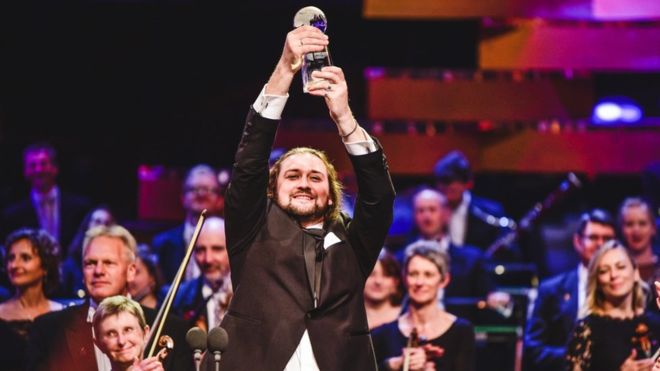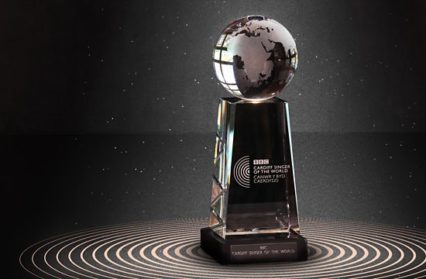Cath Barton travelled to St David’s Hall to witness the awarding of the prestigious Main Prize at the culmination of the BBC Cardiff Singer of the World 2019.
By the time twenty singers have been whittled down to five for the final of the BBC Cardiff Singer of the World competition, the evening is bound to be a feast for the ears. As Sir David Pountney, Chairman of the jury, said in his remarks before announcing the winner of the 2019 competition, it is a privilege and pleasure to celebrate the talents of these young singers, all of whom are now assured a career on the operatic stage.
However, it is a competition and at the end of the evening there is one winner. I think it would be stretching the truth to say they were equally matched, but I do think that, on the basis of their performances on the night, that any one of three could have taken the title of Cardiff Singer of the World 2019: soprano Sooyeon Lee (South Korea), tenor Mingjie Lei (China) or baritone Andrei Kymach (Ukraine). All three had sung two days before in the Song Prize final, in which it was Mingjie Lei who won.
The jury awarded the main prize to Andrei Kymach. Some of the pundits had already earmarked his as ‘the voice of the competition’, but as mezzo-soprano and vocal coach Mary King – one of the guests commenting on the performances for the benefit of TV and radio audiences on the night – acknowledged, ‘not everybody is (to) everybody’s taste’.
Kymach has a powerful, heavy voice. In his opening aria, the Toreador’s song Votre toast, je peux vous le rendre from Bizet’s Carmen, he stood and delivered in appropriate machismo style. In Aleko’s cavatina from the eponymous opera by Rachmaninov, he sang of the character’s love for a woman who has grown cold towards him, but I found his delivery was still stentorian, even when singing words which translate as ‘why does my heart tremble?’ Similarly, in his final piece, Crudo, funestra smania… La pietade in suo favorea, sung by the vengeful Enrico in Lucia di Lammermoor by Donizetti, Kymach sang of different emotions but, to me, in similar style, loud and bombastic. Others, I know, found his voice beautiful and his communication skills compelling. What is clear is that he has the weight of sound and consistency of technique that will enable him to sustain a character such as Enrico through the length of a two and a half hour long opera. This was one of the considerations that jury member Wasfi Kani, the creator of Grange Park Opera, mentioned in an interview clip during the evening.
There was also a revealing comment made by David Pountney, responding to presenter Danielle de Niese’s question about how he had found the week’s competition, about the different challenges faced by young singers with lighter voices, ‘a more scalpel-like instrument’ and those with heavier voices, ‘dealing with a larger vessel.’ In this final there were, as he said, two lighter and three really heavy voices.
After Kymach came those two singers with the lighter voices. Soprano Sooyeon Lee had also chosen music from Lucia di Lammermoor for her main prize heat, and had won her place in the final on the basis of her vivid interpretation of Lucia’s mad scene. She was just as thrilling in the music she chose for final. In Caro nome from Verdi’s Rigoletto her beautifully spun sound captivated the audience, especially in the soaring cadenza. The high tessitura of both this and Ah, non credea mirati… Ah! Non giunge from La sonnambula by Bellini require a singer who is in complete command of her voice. Lee never faltered. She was no doubt conscious that she was treading in the footsteps of Joan Sutherland, the first patron of the Cardiff Singer prize, who was largely responsible for the revival of this opera in the 1960s.
Both Lee and the tenor Mingjie Lei had immediate rapport with the audience. They are both lyrical singers; maybe their voice types facilitate that easy communication, but it does not come automatically. Lei said to presenter Josie d’Arby before his performance that he had ‘something to say’ in his first piece – the aria from Mozart’s Die Zauberflöte in which Tamino falls in love with Pamina on sight – and he did just that. In Narciso’s aria Tu seconda il mio desegno from Il Turco in Italia (Rossini) he demonstrated wonderful agility and control in the coloratura, and never pushed his voice. If there is a question about whether his sound is big enough to carry to the back of the concert hall in this repertoire, it is a question about the maturity of the voice only, not its innate quality. In the rarely-performed vocalise Magische Töne from Die König in von Saba by the Hungarian Karl Goldmark, Lei truly did produce the magical sounds of the title, ending on a sustained high note which held the audience spellbound.
Next came the wildcard contestant, chosen by the jury to join the winners of the four heats. Mezzo Guadalupe Barrientos (Argentina) has an incredibly powerful voice which might be classed contralto were she not also able to reach the higher notes of the mezzo range with evident ease. She impressed in Esser madre à un inferno from L’Arlesiana by Francisco Cilea, lamenting the trials of motherhood. However she took Printemps qui commence (Saint-Saens, Samson et Dalila) at a sluggish, over-indulgent pace, leading to a loss of legato line and intonation lapses. Her final piece, Sabbath morn at sea, from Elgar’s Sea Pictures, for me sadly fell short in comparison with memories of Janet Baker’s interpretation; although Barrientos soared in the climax, her diction was imperfect and her gestures were distractingly histrionic.
The final contestant, bass Patrick Guetti (USA) delighted the audience with his low notes, the light and shade of his singing and his acting ability. He opened with the extract from Siegfried which he had included in the programme with which he won round two of the heats – Wer bist du, Kühner Knabe – demonstrating that he is without doubt a Wagnerian singer in the making, as indeed Barrientos may be. In Il lacerato spirito from Verdi’s Simon Boccanegro, in which the character Fiesco sings of his devastation at the death of his daughter, Guetti showed his vocal and emotional range, but in Solche hergelaufne Laffen from Mozart’s Die Entführung aus dem Serail he perhaps overdid his gestures in his portrayal of Osmin’s threats to his rival in love. Copland’s I bought me a cat (Old American Songs) is always a crowd-pleaser, though arguably more suited to the recital hall, with piano; the doubling of colour for the various animals in the orchestra detracts a little from the impact of the singer’s sound effects.
And so came the awards. The Dame Joan Sutherland audience prize, given this year in memory of the much-loved baritone Dmitri Hvorostovky, was awarded to the mezzo Katie Bray (England) and presented by Dame Joan’s widower, Richard Bonynge. It was good to see Bray acknowledged in this way – although she had not been selected for either the song prize or main prize final, her singing was crystalline and her repertoire choices refreshing.

Photo Credit: Kirsten McTernan
The announcement of Andrei Kymach as BBC Cardiff Singer of the World 2019 was greeted with enthusiastic applause by the audience. He stands in a great tradition. The other four finalists will bring their own special talents to the world’s opera houses.
Singers Dame Felicity Lott, Frederica von Stade and José Cura were also members of the jury. The BBC National Orchestra of Wales led by Lesley Hatfield and with guest conductors Ariane Matiakh and Ewa Strusińska, played with panache. Petroc Trelawny, Josie d’Arby and Elin Manahan Thomas completed the presenting line-up for the BBC with customary efficiency.
BBC Cardiff Singer of the World returns in 2021.
Cath Barton won the New Welsh Writing AmeriCymru Prize for the Novella with The Plankton Collector, which is published by New Welsh Review under their Rarebyte imprint. Her second novella will be published by Louise Walters Books in 2020, and in early 2021 Retreat West Books will publish her collection of short stories inspired by the work of the Flemish artist Hieronymus Bosch.



 Enjoyed this article? Support our writers directly by buying them a coffee and clicking this link.
Enjoyed this article? Support our writers directly by buying them a coffee and clicking this link.








